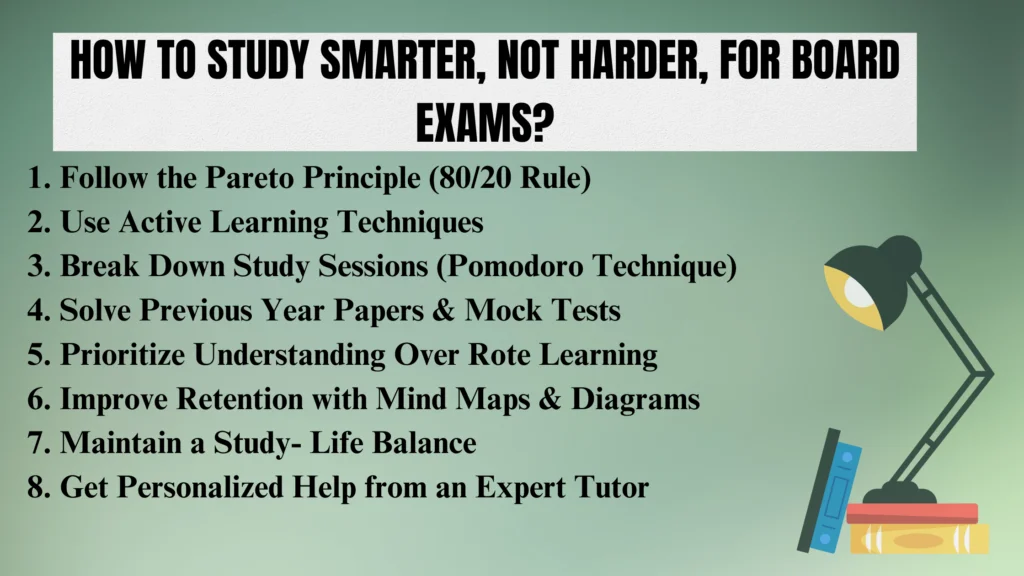Board exams are a crucial milestone in every student’s academic journey. Many students believe that studying for long hours guarantees success, but that’s not always true. Instead of studying harder, it’s essential to study smarter—a strategy that maximizes learning while reducing unnecessary stress. Here’s how you can do it:
1. Follow the Pareto Principle (80/20 Rule) – Board Exams
Not all topics carry equal weight in the exam. The 80/20 rule suggests that 80% of your results come from 20% of your efforts. Identify high-weightage chapters and focus more on them while ensuring you understand the basics of the rest.
2. Use Active Learning Techniques – Board Exams
Passive reading won’t help you retain information. Instead, try:
- Teach what you learn – Explaining a topic to someone else strengthens your understanding.
- Use Flashcards & Mnemonics – These help in memorizing formulas, vocabulary, and key facts faster.
- Make Summary Notes – Instead of re-reading entire chapters, jot down key points in your own words.
3. Break Down Study Sessions (Pomodoro Technique) – Board Exams
Avoid marathon study sessions. Use the Pomodoro Technique:
- Study for 25-50 minutes, take a 5-10 minute break, and repeat.
- This method boosts focus and prevents burnout.
4. Solve Previous Year Papers & Mock Tests – Board Exams
Practicing past board exam papers helps familiarize you with the exam pattern and boosts confidence. Try to simulate exam conditions while solving them.
5. Prioritize Understanding Over Rote Learning – Board Exams
Instead of memorizing, understand the concepts behind formulas and theories. When you grasp the logic, you can apply knowledge effectively in different types of questions.
6. Improve Retention with Mind Maps & Diagrams – Board Exams
Visual learning aids like mind maps, flowcharts, and diagrams make complex topics easier to remember. These techniques work well for subjects like Science, History, and Geography.
7. Maintain a Study-Life Balance – Board Exams
Don’t exhaust yourself. Ensure you:
- Get 7-8 hours of sleep for better memory retention.
- Take short walks or exercise to keep your mind fresh.
- Stay hydrated and eat brain-boosting foods like nuts and fruits.
8. Get Personalized Help from an Expert Tutor – Board Exams
If you struggle with certain subjects, personalized guidance from an experienced tutor can help. A home tutor can:
- Explain difficult topics in a way that makes sense to you.
- Provide study plans customized to your strengths and weaknesses.
- Keep you accountable and motivated.
How TheTuitionTeacher Helps You Study Smarter – Board Exams
At TheTuitionTeacher, we connect students with experienced home tutors who provide one-on-one coaching, helping you:
- Focus on weak areas while reinforcing strong ones.
- Learn exam strategies to write better answers and score high.
- Get personalized attention that isn’t possible in large coaching centers.
Instead of spending long, unproductive hours struggling alone, let an expert guide you. Find the perfect tutor near you and start preparing for your board exams the smart way!
Studying smart isn’t about cutting corners—it’s about using the right techniques to learn efficiently. With proper planning, active learning, and expert guidance, you can excel in your board exams with confidence!







